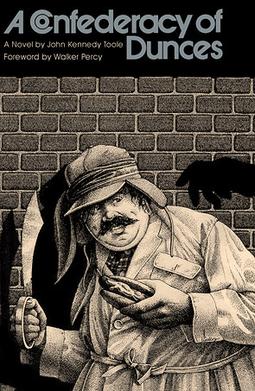was first published in 1980, eleven years after Toole's suicide. A picaresque novel, it depicts the adventures of a roguish, but appealing hero, of low social class, who lives by his wits in a corrupt society. The book's title refers to an epigram from Jonathan Swift's essay, Thoughts on Various Subjects, Moral and Diverting: "When a true genius appears in the world, you may know him by this sign, that the dunces are all in confederacy against him."
The book's central character, Ignatius J. Reilly, is an educated but slothful 30-year-old man living with his mother in the Uptown neighborhood of early-1960s New Orleans who, in his quest for employment, has various adventures with colorful French Quarter characters. Toole wrote the novel in 1963 during his last few months in Puerto Rico.
The novel was finally published through the efforts of writer Walker Percy and Toole's mother, Thelma. It became first a cult classic, then a mainstream success; it earned Toole a posthumous Pulitzer Prize for Fiction in 1981, and is now considered a canonical work of the modern literature of the Southern United States.

